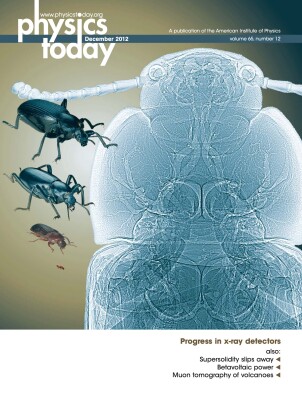From Here to Infinity: A Vision for the Future of Science
DOI: 10.1063/PT.3.1822
Besides making fundamental contributions to essentially every area of astrophysics, Martin Rees has been a leader in science and technology policy. From 2005 to 2010, he served as president of the UK’s Royal Society. He has given many lectures and written many books for a general audience about science and the modern world. From Here to Infinity: A Vision for the Future of Science, which is based on his four BBC-sponsored Reith Lectures from 2010, is the best available brief summary of Rees’s views on science and its implications.

Rees is passionate about increasing the general understanding of science. In the chapter “The Scientific Citizen,” he says,
It’s a cultural deprivation not to appreciate the panorama offered by modern cosmology and Darwinian evolution—the chain of emergent complexity leading from some still-mysterious beginning to atoms, stars, and planets—and how, on our planet, life emerged and evolved into a biosphere containing creatures with brains able to ponder the wonder of it all. This common understanding should transcend all national differences—and all faiths too. (page 19)
It’s a cultural deprivation not to appreciate the panorama offered by modern cosmology and Darwinian evolution—the chain of emergent complexity leading from some still-mysterious beginning to atoms, stars, and planets—and how, on our planet, life emerged and evolved into a biosphere containing creatures with brains able to ponder the wonder of it all. This common understanding should transcend all national differences—and all faiths too. (page 19)
Rees notes that there is now, for the first time, a “huge gulf between the artifacts of our everyday life and what even a single expert, let alone the average child, can comprehend” (page 120). Many common gadgets are magic black boxes. If you take apart a mobile phone, for example, you will find in its miniaturized mechanisms few clues about how it works. Moreover, with increasing urbanization, most people have less contact with the natural world. To compensate, science education must be more effective. Ubiquitous computers and the Web can help.
The difficulty of understanding even something as basic as an atom should induce skepticism of anyone claiming to have answered the most profound aspects of our existence. “So,” Rees says, “I have no religious beliefs; however, I respect the customs and rituals of the Anglican Church in which I was raised” (page 127). Because he has denied that science and religion should be regarded as enemies, Rees says he’s been described on Richard Dawkins’s website as a “compliant Quisling.”
Rees also wants people to understand the limitations of science and technology. It is sometimes much easier to comprehend distant things than nearby ones; scientists have long been able to predict solar eclipses, but it’s hard to forecast, even a day before, whether an eclipse will be visible through clear skies. The US program of Moon landings was a success because celestial mechanics and rocketry were already understood, but the “war on cancer” has been much less successful because so much relevant science is still being discovered. People also need to understand risk. “We fret unduly about carcinogens in food and low-level radiation,” Rees says. “But we are in denial about low-probability, high-consequence events that should concern us more. The recent financial crash was one such event; but others that haven’t yet happened—lethal pandemics are one example—should loom higher on the agenda” (page 23).
In 2003 Rees published an entire book on the unique dangers of the 21st century. His working title was Our Final Century? (His British publisher, Heinemann, removed the question mark; the title change by the US publisher, Basic Books, to Our Final Hour shows, Rees says, the impatience of the US public.) He conjectured that, taking all risks into account, there is only a 50% chance to get through the present century without a disastrous setback. Rees says he’s been surprised by how many colleagues think a catastrophe is even more likely. He calls himself a “ techno-optimist,” since most people’s lives have been so greatly enhanced by science and technology, and he sees so many opportunities now for the transformational power of optimally applied science in impoverished regions.
That sentiment is succinctly summed up on page 73 in the chapter titled “Surviving the Century”:
There seems to be no scientific impediment to achieving a sustainable world beyond 2050, in which the developing countries have narrowed the gap with the developed, and all benefit from further advances that could have as great and benign an impact as information technology has had in the last decade. But the intractable politics and sociology—the gap between potentialities and what actually happens—engender pessimism.
There seems to be no scientific impediment to achieving a sustainable world beyond 2050, in which the developing countries have narrowed the gap with the developed, and all benefit from further advances that could have as great and benign an impact as information technology has had in the last decade. But the intractable politics and sociology—the gap between potentialities and what actually happens—engender pessimism.
Although I didn’t find a unified “vision for the future of science” in From Here to Infinity, there are vision fragments scattered throughout this collection written by a wise, well-informed scientific leader. No doubt Rees would agree with Albert Einstein, who said, “Politics is more difficult than physics.”
More about the authors
Joel Primack is a Distinguished Professor of Physics and director of the High-Performance Astrocomputing Center at the University of California, Santa Cruz. His decades of work in cosmology include two papers with Martin Rees and popular books on the subject. He has also written articles on science and public policy.




